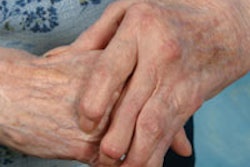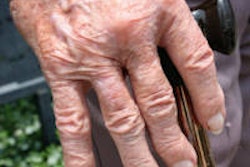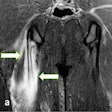A study of health services in eight European countries has found lengthy delays are occurring in the specialist assessment of patients with suspected rheumatoid arthritis, prior to imaging. The average delay between the start of symptoms to assessment was 24 weeks, with the percentage of people seen within 12 weeks varying from 8% to 42%.
"Intervention is required to ensure that more patients are assessed within the window during which they are most likely to respond to treatment -- that is, the first three months," noted Dr. Karim Raza, from the Rheumatology Research Group at the University of Birmingham, U.K. "However, in all cases the median time from symptom onset to assessment by a rheumatologist was greater than or equal to four months."
Raza and his coauthors looked at the contribution of patient and professional behavior and health systems to delays in the assessment of patients with rheumatoid arthritis in 482 people attending 10 specialist rheumatology centers in eight European countries in 2009-2010. These comprised centers in Birmingham, Prague, Warsaw, Vienna, Berlin, Heraklion (Greece), Zurich, and Stockholm, Lund, and Umeå in Sweden.
They looked at four levels of delay: how long it took before patients made a request to see a healthcare professional about their symptoms; how long it then took that professional to see the patient; how long it then took the healthcare professional to make a referral to a rheumatologist; and how long it took before the rheumatologist then saw the patient. They have published their findings in online article published on 4 August in the Annals of the Rheumatic Diseases.
In Heraklion, patients waited an average of 22 weeks before seeking help from a healthcare professional, whilst in Berlin and Vienna patients saw a healthcare professional within an average of two weeks. Patients in the U.K. waited around 12 weeks before seeing their general practitioner (GP).
The authors highlight a report from the U.K. National Audit Office (NAO), which calculated that doubling the current estimated 10% to 20% of patients treated with disease-modifying drugs within three months of symptom onset might increase costs to the National Health Service by 12.6 million euros ($18 million U.S.) over five years. However, productivity gains for the U.K. alone of around 35.5 million euros ($51 million U.S.) could be expected, in addition to increasing quality of life for patients, according to the NAO.
"Across Europe, delays in the assessment of patients with rheumatoid arthritis by rheumatologists are unacceptably long. As highlighted in a recent report from the U.K. National Audit Office, tackling this should represent a priority for strategies to improve patient outcomes," Raza concluded.
To read the entire study click here.















